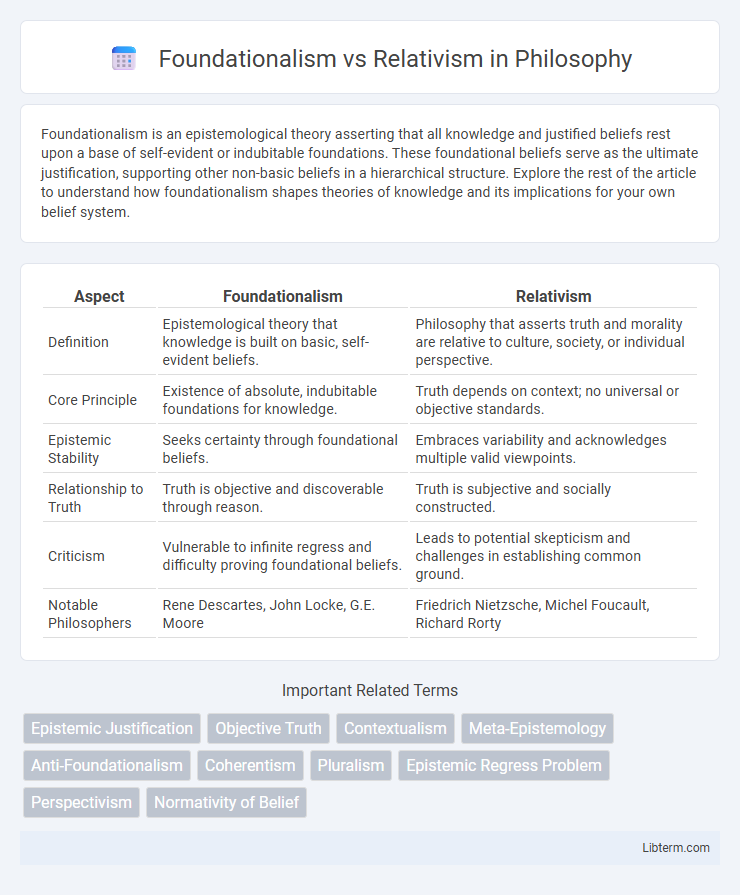Foundationalism is an epistemological theory asserting that all knowledge and justified beliefs rest upon a base of self-evident or indubitable foundations. These foundational beliefs serve as the ultimate justification, supporting other non-basic beliefs in a hierarchical structure. Explore the rest of the article to understand how foundationalism shapes theories of knowledge and its implications for your own belief system.
Table of Comparison
| Aspect | Foundationalism | Relativism |
|---|---|---|
| Definition | Epistemological theory that knowledge is built on basic, self-evident beliefs. | Philosophy that asserts truth and morality are relative to culture, society, or individual perspective. |
| Core Principle | Existence of absolute, indubitable foundations for knowledge. | Truth depends on context; no universal or objective standards. |
| Epistemic Stability | Seeks certainty through foundational beliefs. | Embraces variability and acknowledges multiple valid viewpoints. |
| Relationship to Truth | Truth is objective and discoverable through reason. | Truth is subjective and socially constructed. |
| Criticism | Vulnerable to infinite regress and difficulty proving foundational beliefs. | Leads to potential skepticism and challenges in establishing common ground. |
| Notable Philosophers | Rene Descartes, John Locke, G.E. Moore | Friedrich Nietzsche, Michel Foucault, Richard Rorty |
Introduction to Foundationalism and Relativism
Foundationalism asserts that knowledge is built upon basic, self-evident beliefs serving as the ultimate foundation for justification, grounding all other beliefs in objective certainty. In contrast, Relativism denies universal or absolute truths, arguing that knowledge and truth depend on cultural, social, or personal perspectives. These opposing epistemological theories highlight the debate between objective certainty and subjective interpretation in understanding knowledge.
Historical Roots of Foundationalism
Foundationalism traces its origins to ancient Greek philosophy, notably in the works of Aristotle who emphasized the pursuit of indubitable knowledge through empirical observation and logical deduction. During the modern era, Rene Descartes profoundly shaped foundationalism by advocating for a method of radical doubt to establish certain foundational beliefs as the basis for all knowledge. This approach contrasts with relativism, which rejects absolute foundations in favor of context-dependent truths, highlighting the historical emphasis on certainty and objective knowledge in foundationalist traditions.
Core Principles of Relativism
Relativism centers on the core principle that knowledge, truth, and morality are not absolute but instead vary depending on cultural, historical, or individual perspectives. It asserts that no universal standards exist for validating beliefs, emphasizing context and subjective experience as key determinants of truth. This approach challenges foundationalism by rejecting the idea of fixed, objective foundations for knowledge.
Epistemological Differences
Foundationalism asserts that knowledge is built upon basic, self-evident truths or axioms, providing a stable and objective epistemic foundation. Relativism challenges this by arguing that knowledge is context-dependent, varying across cultures and perspectives without absolute or universal standards. The epistemological difference lies in foundationalism's pursuit of certainty through objective grounds, whereas relativism emphasizes the fluidity and subjectivity of knowledge claims.
Key Philosophers and Theories
Foundationalism, championed by Rene Descartes and later expanded by Immanuel Kant, posits that knowledge is built upon indubitable basic beliefs serving as a secure foundation for further knowledge. Relativism, associated with philosophers like Friedrich Nietzsche and Paul Feyerabend, argues that knowledge and truth are context-dependent, shaped by cultural, historical, or individual perspectives rather than universal standards. The debate centers on whether epistemic justification requires absolute certainty or can accommodate varying viewpoints as equally valid within their frameworks.
Strengths and Weaknesses of Foundationalism
Foundationalism provides a clear structure for knowledge by grounding beliefs on basic, self-evident truths, offering stability and reducing skepticism. Its strength lies in the emphasis on certainty and objectivity, ensuring a reliable basis for further reasoning. However, Foundationalism faces criticism for its difficulty in justifying how basic beliefs are identified and how the foundational layer supports complex or abstract knowledge, often leading to challenges in addressing contextual and cultural variations.
Critiques and Challenges to Relativism
Relativism faces significant critiques for undermining the possibility of objective truth by asserting that all knowledge is context-dependent and culture-bound. Critics argue this leads to logical inconsistencies, such as the self-refuting claim that relativism itself is universally true. The challenge lies in addressing moral and epistemic relativism's inability to provide a stable framework for evaluating conflicting truth claims or ethical standards.
Foundationalism vs Relativism in Science
Foundationalism in science asserts that knowledge is built upon basic, self-evident truths or empirical observations that provide a stable base for scientific theories. Relativism challenges this by arguing that scientific knowledge is contingent on social, cultural, or historical contexts, thereby rejecting universal, objective foundations. The debate highlights tensions between the pursuit of objective truth through foundational principles and the acknowledgment of science as a context-dependent, interpretative practice.
Implications for Ethics and Morality
Foundationalism posits objective moral principles serving as absolute standards for ethical judgments, promoting universal norms across cultures. Relativism asserts that ethical values depend on cultural, social, or individual contexts, challenging the existence of universal moral truths. These contrasting views influence debates on moral accountability, cross-cultural tolerance, and the formulation of global human rights frameworks.
Contemporary Debates and Future Directions
Contemporary debates between Foundationalism and Relativism center on epistemic justification, with Foundationalism advocating for objective, indubitable bases of knowledge such as self-evident truths or sensory experiences, while Relativism challenges universal standards by emphasizing context-dependent and culturally contingent beliefs. Emerging perspectives explore hybrid models incorporating elements of both, addressing critiques related to epistemic absolutism and excessive subjectivity. Future directions in epistemology aim to refine these models using advances in cognitive science and social epistemology to better understand knowledge formation across diverse epistemic communities.
Foundationalism Infographic

 libterm.com
libterm.com